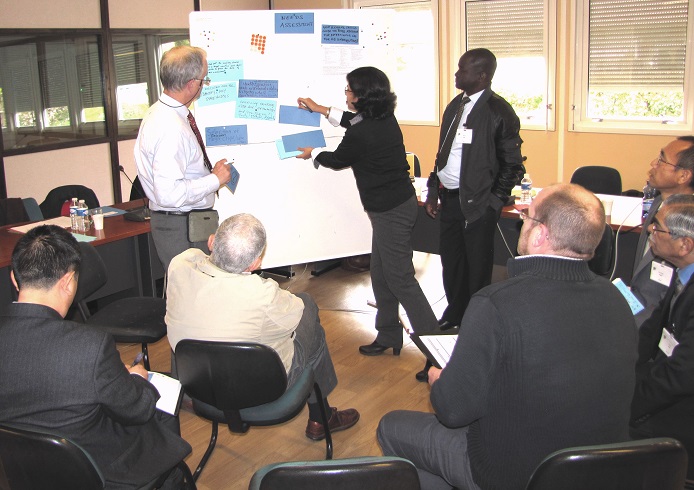An Open Letter from the YPARD SC Chair, Nidhi Nagabhatla: We are growing and we are known!
 Dear YPARdians,
Dear YPARdians,
Greeting from your Chair. I want to begin with a word of thanks to all you champions who have relentlessly worked hard to make YPARD - who we are today- ‘a giant and the only international network of young professionals in agricultural development’. On the top of that ‘We are growing and we are known!’ What makes me say that with so much confidence- first, the sheer numbers and second, the observations/impressions.
While you can read a lot about the former in our annual report, here in this letter I will reflect on the latter based on my very recent experience. From March 19 to 20 March 2015, I was invited to attend the Capacity Development Expert Group Workshop held in Montpellier, France organised by TAP (Tropical Agriculture Platform), one of our strategic partners.
It felt wonderful when in this high level meeting, many of the participants and representatives of highly reputed institutions acknowledged that they know YPARD - its existence, to a good extent its core mandate and to a reasonable one, its various activities in various parts of the world. We all know it is a terrific feeling when you don’t have to explain any more who you are and what do you do. I see it as a big milestone for YPARD and we should jointly celebrate this achievement.
Let me also share some details about the content of the meeting and what that means for YPARD. The core agenda of the two day event was to initiate brainstorming sessions towards a framework for Capacity Development (CD) for Agricultural Innovation Systems or AIS in short. Several sessions focused on highlighting the theoretical and practical dimensions of a ‘Common Capacity Development Framework’ for member’s nations (G20) of TAP and beyond.
The discussions that followed emphasized the significance of simple and clear guidelines and tools for capacity development for all levels of stakeholders, including the youth and gender dimension. It was agreed that needs assessments (who needs what kind of skills to perform the required tasks), programme and project design (that factors regional and local level details and demands) and clear strategy for monitoring and evaluation (to ensure sustainability and value proposition) are important while planning any capacity development initiative.
As some of you may recall, YPARD initiated an online discussion on Youth and Agricultural Innovation Systems back in 2012 that stirred a fair degree of interest in our members to know and understand the AIS concept and to remain actively involved in related debates. Over time, AIS has evolved from a concept to a set of principles guiding the analysis and action for investments /interventions that can most likely strengthen and promote equitable growth in agriculture while addressing concerns of food security, livelihood diversification and poverty alleviation.
TAP’s current initiative CD-AIS (Capacity Development for Agricultural Innovation Systems) could serve as a possible connector for active engagement between TAP and YPARD. In addition, note that the Capacity Development is an overarching target of the post-2015 development agenda (Sustainable Development Goals, more specifically, Goal 17).
Acknowledging that capacity development is a sequential process, the experts re-iterated the need of a Common Framework in their final recommendations. The group also reached a consensus on the point that capacity development can only achieve effectiveness and efficiency when global visioning is matched with regional/local action (s) and when the stakeholder involvement strategy is gender and youth inclusive. A significant component of the framework should focus on assessing the diverse needs for the different target groups. Correspondingly, the monitoring and evaluation (M&E) strategy should appropriately factor the time dimension and the target group.
A direct take away for YPARD is an opportunity to liaise with ongoing pilot studies of CD-AIS project to ensure that Capacity Development needs assessment captures and represents the youth component to a satisfactory level. Besides, the TAP’s network opens potential for YPARD to link with related institutions and core experts in the agricultural development sector. YPARDians can also realize that TAP is initiating a central knowledge repository (as a long term objective) to support data information and knowledge needs of tropical agriculture systems, including capacity development opportunities.
The interface will be refereed as ‘TAPipedia’ and will allow partners to contribute to its content. As a global community and a widespread network, YPARD and its members, spread across latitudes and longitudes, should remain engaged with all knowledge related activities, especially when initiatives are managed by our key partners. I would encourage all members to refer to the final version of the Capacity Development Expert Group’s review report available on TAP website.]
Let me once again underline that ‘Capacity Development of Youth remains as the core agenda in YPARD’s strategic objectives and we constantly look forward working closely with our strategic partners to ensure that our key objectives are achieved. I do believe that YPARD can take note of the framework of Capacity Development prepared by TAP and explore ways to incorporate that knowledge in our own capacity development agenda and action.
Lastly kudos to all the hard work and relentless effort of all YPARD folks who have helped us realise our vision of ‘capacity strengthening of young professionals towards innovative agricultural development’. Well done Champions!
Nidhi Nagabhatla
Chair-YPARD Steering Committee
Dr Nidhi Nagabhatla
United Nations University (UNU-INWEH)
Hamilton, ON L8P 0A1
CANADA
Related Posts
Comments
By accepting you will be accessing a service provided by a third-party external to https://archive.ypard.net/

